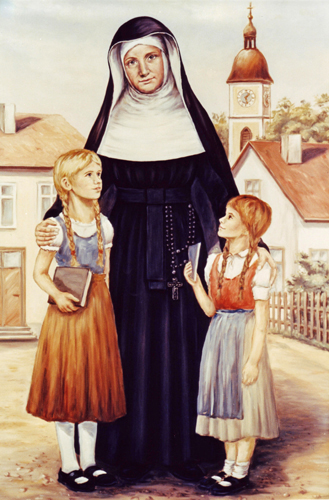Blessed Theresa Gerhardinger Biography
June 20, 1797–May 9, 1879
 The genesis of this topic comes from reading the letters of the Foundress of the School Sisters of Notre Dame, Blessed Theresa Gerhardinger. She was rooted in Christ and this primary relationship guided her life. She was born in Stadtamhof near Regensburg, Bavaria in 1797 and died in Munich, 1879. One significant aspect of her history is that she lived in the post-Napoleonic era in which illegitimacy was high.1 Educating women was seen as the key to stabilizing families and society.
The genesis of this topic comes from reading the letters of the Foundress of the School Sisters of Notre Dame, Blessed Theresa Gerhardinger. She was rooted in Christ and this primary relationship guided her life. She was born in Stadtamhof near Regensburg, Bavaria in 1797 and died in Munich, 1879. One significant aspect of her history is that she lived in the post-Napoleonic era in which illegitimacy was high.1 Educating women was seen as the key to stabilizing families and society.
Educating women was fostered by two holy priests, Bishop Michael Wittmann, and Father Francis Sebastian Job. Both of them encouraged Mother Theresa and believed in her giftedness. They empowered her belief that she could lead her own congregation.
And both died within a year of the founding of the School Sisters of Notre Dame, 1833.
Father Francis Sebastian Job, her mentor, encouraged education for female youth. He wrote: "If a new, superior generation is to appear if better times are to come, the commencement must be made by training female youth. Above all, we again need pious, Christian mothers; they are the first to foster and educate human posterity; they are the vigilant guards of domestic discipline. Teachers and educators will then continue the work of God with the best success in each of their pupils, if it may be asserted of each: 'He imbibed the spirit of piety with his mother's milk!'"2
This "work of God" also included the partnership of women and men in ministry.3
A third priest, Father Matthias Siegert, remained Mother Theresa's friend, confidante, and clerical advisor for fifty years, dying just a few weeks after her own death. These men of the church never tried to control her or her congregation. They respected her role as Foundress of a new kind of women's congregation, recognizing that she "lived in Jesus." (John 15:4)
Blessed Theresa Gerhardinger's contribution to both the Catholic Church and the people of Bavaria has been noted in her being named "Blessed" in 1985 by Pope John Paul II and inducted into the Bavarian Hall of Fame in 1998.4 Much could be said of this remarkable woman.
Footnotes:
- "In the Oberpfalz area, every third child was born out of wedlock, a pastor wrote; in Altotting, half of all children born within one year were said to have been born outside the family." (Mayrhofer, 2) Education in the Federal Republic of Germany, Barbara Brumleve, SSND. SSND Heritage Research Publications, 1984, #7, p. 9.
- SPIRIT of the CONSTITUTIONS FOR THE RELIGIOUS CONGREGATION OF Poor School Sisters of Notre Dame, Devoted to the Education of Female Youth, sketched by Francis Sebastian Job, August 1833. (Milwaukee: Convent Print, 1892) p. 5.
- "How we relish the thought even now of working beside you in the vineyard of the Lord by the teaching and training of the little ones, and so, lightening your burden." Hester Valentine, SSND, ed. Letters of Mother Theresa, Vol. I, #164, November 9, 1839, to the Pastor at Wolfratshausen, p. 131.
- "Mother Theresa, as she is addressed by her sisters, is not only a person of German tongue who did something significant, as required by King Louis for the Valhalla, but her work that continues to the present day has made a decisive contribution to the improvement of life and education for women and girls. In fact, Sister Mary Theresa could be called one of the most important pioneers for women's rights and human rights in our area." (italics mine) Hans Zehetmair, Bavarian Minister of Education, Culture, Science and the Arts, Valhalla, September 3, 1998.